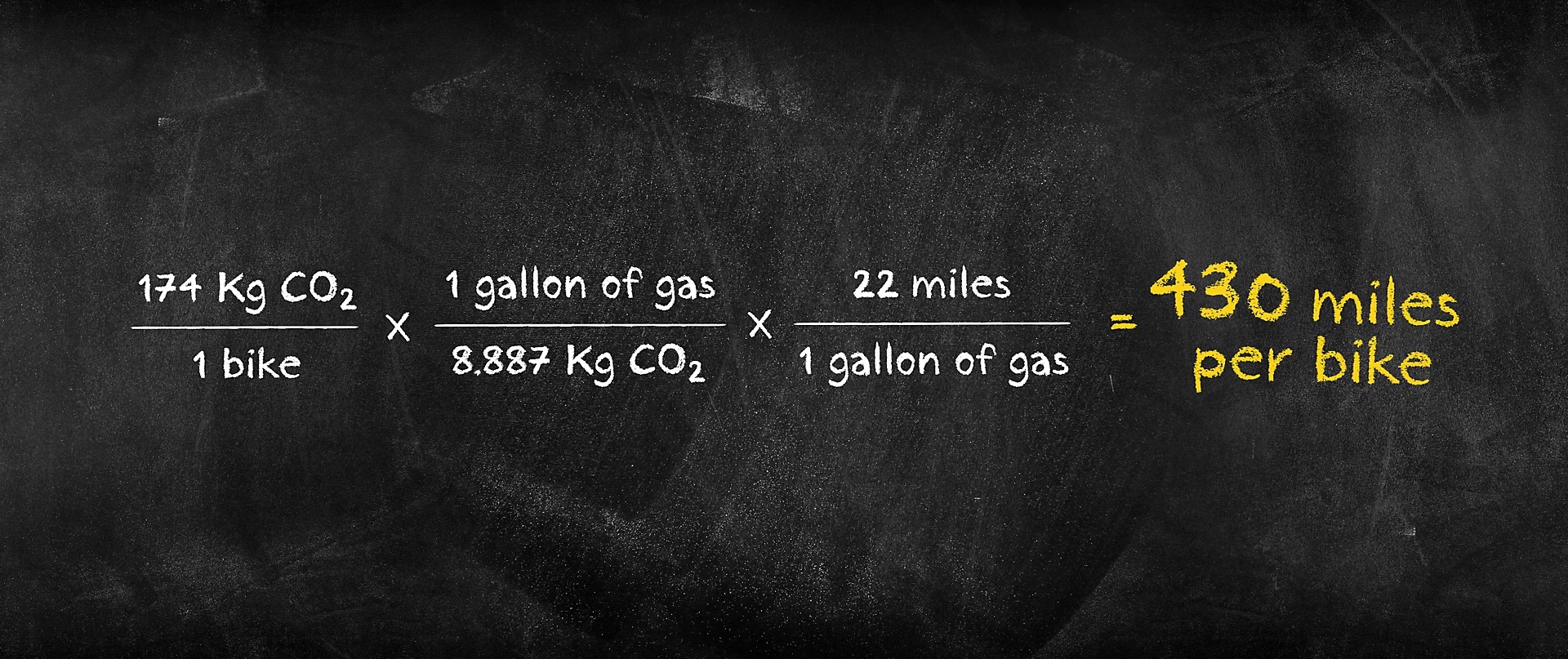The Trek sustainability report isn’t new news, but thanks to the upcoming ‘Bike Week’, some PR has reminded us of the ‘Rule of 430’, which got us wondering. We thought it might get you wondering too…
How to make your bike carbon neutral: The Rule of 430

This rough and ready rule is based on the average carbon footprint of four of Trek’s most popular models – Madone, Rail, Fuel EX and Marlin (for those unfamiliar with the models, that covers road, e-MTB, hardtail and full suspension). Added to the formula is the assumption that your car gets 22 miles to the gallon, and out pops the number 430 – the number of miles you need to ride instead of driving to make your ride carbon neutral.

Oh yes, uh huh. How often do you ride your Marlin instead of going on the school run in the car? Or take your Madone to the supermarket? So, hmm. Perhaps you should see the equation as ‘how many miles do you need to ride or walk instead of driving in order to offset your bike purchase?’. Or maybe it’ll make you think harder about the environmental cost of play, and make you hold on to your bike a little longer before swapping to a newer model – or just get out on it a bit more to help justify that swap?
The Rule of a bit more than 430
Looking at the formula again, it’s based on the average CO2 emissions across the range – 174 kg CO2. If you want to be a little more honest with yourself about the impact of your bike, you could look at the detail of Trek’s analysis. If your bike is a full suspension mountain bike, you might like to put a different number into that formula, something like 200-225 kg CO2 maybe, or more still for an e-MTB.
And does your car do 22 miles to the gallon? If you’ve got a VW T5, it’s probably more like 35 miles to the gallon. A Ford Transit is maybe about 30 mpg. A Citroen Berlingo is more like 48mpg. Those kinds of mileage are going to make a whopping great big difference to your offset mileage number.


And what if you have more than one bike? It’s not exactly unheard of. Then you’re going to need to ride a lot more miles (instead of driving) to offset your n+1 collection.
Join our mailing list to receive Singletrack editorial wisdom directly in your inbox.
Each newsletter is headed up by an exclusive editorial from our team and includes stories and news you don’t want to miss.
A cargo bike example
But what about those bikes that truly are car replacements? The cargo bikes, electric town bikes and so on? Since Trek doesn’t make a cargo bike, there isn’t a comparator in their report, but elsewhere PedalMe has calculated that an electric cargo bike has a manufacturing cost of around 280kg CO2.
I have been riding around on a long tail Benno Boost for nearly a year now – a slightly different set up to the bucket style cargo bikes that PedalMe uses, but let’s go with the 280kg figure anyway. If I wasn’t riding the Benno, I’d be in my Volvo, which gets about 45mpg. Which gives me 1418 miles before I start offsetting the Benno’s manufacturing.

The odometer on the Benno currently shows 2447km, which is 1520 miles – so while it did have some miles on the clock when it came to me for test, I think it’s basically taken me a year to cross that offset boundary. Except that in that time is has been charged up lots of times with electricity, which I’ve not accounted for, and it’s had a new chain (two actually, because it’s so long). Really, it needs another new chain and cassette now – so a few more emissions there. But, roughly speaking, a year of genuine car replacement riding to cross the manufacturing offset threshold.
Car replacement and bike offset
If you’re not in the market for a full on cargo bike car replacement, how many journeys could you swap out to a bike instead of a car? And now you’ve worked out the carbon cost of your bike collection, how many miles of swap will you need to break even? We’d be interested to hear the results of your calculations – head to the comments!
While you’re here…
If you’re really keen to leave the car at home but don’t want to be riding a full suspension mountain bike to the shops, a second hand bike with a milk crate or panniers attached could be a great car replacement. Check out our guide to buying a second hand bike:
For an in depth look at the Trek Sustainability Report, head here:






